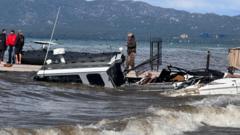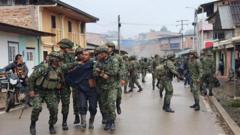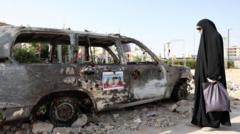In the aftermath of a tragic attack that claimed 26 lives, Indian authorities have intensified their efforts to hunt down suspects in Kashmir, leading to the demolition of homes belonging to alleged militants. The incident, which occurred near the tourist town of Pahalgam, marks one of the deadliest assaults on civilians in two decades within the region. In a bid to investigate and gather intelligence, security forces have also detained a significant number of individuals—over 1,500—since the violence erupted last Tuesday.
India Intensifies Manhunt Following Deadly Kashmir Attack

India Intensifies Manhunt Following Deadly Kashmir Attack
Amidst mounting tension, authorities in India respond vigorously to last week's devastating attack in Kashmir, leading to demolitions and heightened security measures.
The demolitions point to a controversial approach, targeting properties linked to the families of militants involved in the attack. Despite the gravity of the situation, local leaders have expressed concerns over the repercussions faced by innocent civilians and called for a distinction between those involved in militant activities and the wider community. Jammu and Kashmir Chief Minister Omar Abdullah emphasized the importance of punishing offenders without causing collateral damage to innocents, echoing former chief minister Mehbooba Mufti's caution against unjust actions.
The Indian government has pointed fingers at Pakistan, accusing it of fostering terrorist activities in the region, but has so far refrained from naming any specific groups. Tensions escalated between the two nuclear-armed neighbors shortly after the attack, as India suspended the Indus Waters Treaty—a crucial water-sharing agreement—prompting protests from Pakistan. In retaliation, Pakistan suspended the Simla agreement, further complicating diplomatic relations between the two countries.
As the situation continues to unfold, Prime Minister Narendra Modi has vowed to pursue the perpetrators to the furthest ends, committing to ensuring justice for the victims' families. Meanwhile, international responses have begun to emerge, with the U.S. State Department urging both nations to seek a peaceful resolution to the escalating conflict.
The conflict in Kashmir, which has persisted since 1947, remains a significant flashpoint for Indo-Pakistani relations, and the recent violent events have reignited fears of further outbreaks of conflict in the region.
The Indian government has pointed fingers at Pakistan, accusing it of fostering terrorist activities in the region, but has so far refrained from naming any specific groups. Tensions escalated between the two nuclear-armed neighbors shortly after the attack, as India suspended the Indus Waters Treaty—a crucial water-sharing agreement—prompting protests from Pakistan. In retaliation, Pakistan suspended the Simla agreement, further complicating diplomatic relations between the two countries.
As the situation continues to unfold, Prime Minister Narendra Modi has vowed to pursue the perpetrators to the furthest ends, committing to ensuring justice for the victims' families. Meanwhile, international responses have begun to emerge, with the U.S. State Department urging both nations to seek a peaceful resolution to the escalating conflict.
The conflict in Kashmir, which has persisted since 1947, remains a significant flashpoint for Indo-Pakistani relations, and the recent violent events have reignited fears of further outbreaks of conflict in the region.




















